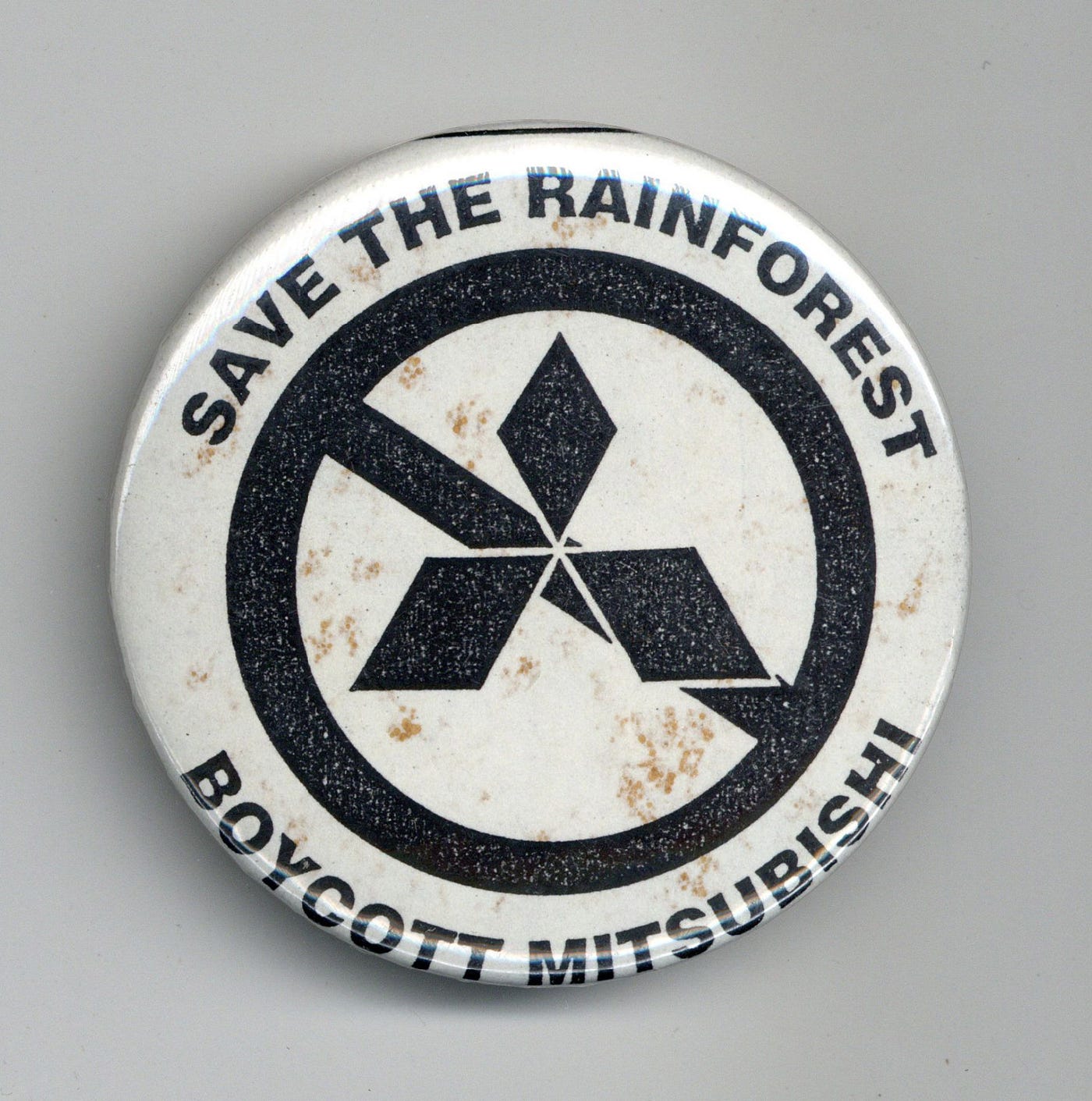Preserving the legacy of Bay Area Action’s environmental work from 1990–2000 and beyond.
Learn more...
Rainforest Action Network (RAN) targeted Mitsubishi Corporation in the 1990s for its significant role in environmental destruction, particularly deforestation in tropical rainforests. Mitsubishi was one of the largest corporate contributors to logging and deforestation globally at the time.

“For forty years, it has consistently been one of the largest importers of tropical timber in Japan,” said Jonathan Luman of Defenders of the Rainforest in December 1996. “It has operations, or purchases large volumes of timber, from nearly every continent. It has destroyed native communities, evaded millions of dollars in taxes, broken numerous national laws, and permanently degraded million year old forests.”
“Mitsubishi is not just destroying forests, it is destroying cultures. The Penan, Kayan, Kenyah, Kelabit, and Iban tribes are all desperately trying to save their homes from logging. They have tried legal petitions, but their rights have not been recognized. They have set up road-blocks to stop the logging trucks only to be arrested. Many of them have spent weeks in jail for defending territories they have occupied for thousands of years.”
Large-scale logging operations — Mitsubishi was heavily involved in logging operations in tropical rainforests, including in Southeast Asia, South America, and other regions. These activities were linked to the destruction of critical ecosystems, loss of biodiversity, and displacement of indigenous communities.
Rainforest destruction — Environmental groups accused Mitsubishi of being responsible for a significant percentage of global rainforest destruction. RAN’s campaign highlighted how Mitsubishi’s activities contributed to climate change, habitat loss, and the endangerment of species reliant on these ecosystems.
Unsustainable forestry practices — Mitsubishi was criticized for failing to adopt sustainable forestry practices. Activists argued that the company prioritized profits over environmental stewardship, exacerbating deforestation rates and ignoring calls for more responsible resource management.
Pulp and paper industries — Mitsubishi was also a major player in the pulp and paper industries, linked to large-scale clearing of forests for plantations and industrial use. This contributed to soil degradation, water pollution, and destruction of natural habitats.

Many members of the Mitsubishi corporate family were responsible for forest destroying activities, according to Defenders of the Rainforest:
To cover its tracks, Mitsubishi Corp. invested heavily in public relations and greenwash marketing to counteract negative press. The company worked to control the narrative by emphasizing its positive contributions rather than addressing the core issues raised by activists.
For example, a Mitsubishi Corporation joint venture in Canada, which clearcut massive of one-hundred-year-old Aspen forests, produced between six and eight million pairs of disposable chopsticks a day. These were exported to Japan where they were sold as “chopsticks that protect nature.” [Joshua Karliner, “God’s Little Chopsticks” Mother Jones, September/October 1994, p16]

As early as 1990, BAA’s Action Team collaborated with organizations like RAN to pressure Mitsubishi to change its ways. Greenpeace, the Sierra Club, Friends of the Earth, and Earth First! were also part of the coalition effort.
BAA continued support for RAN’s boycott throughout the 1990s. The campaign was part of Earth Day 1997’s Forests for the Future education outreach, during which BAA volunteers built RAN’s very first internet boycott petition, pioneering digital activism for the environmental movement.

In 1993 BAA’s High Schools Group adopted the boycott against Mitsubishi as a campaign, organizing demonstrations at Mitsubishi retail locations, conducting a letter-writing campaign, and distributing educational materials about the environmental impact of Mitsubishi’s logging operations.
Schools Group members, BAA members, and Earth Circus demonstrated at Mitsubishi Motors’ Almaden dealership in San Jose, CA, twice in October 1993.
These efforts were part of a broader movement among RAN’s coalition to engage young people in environmental activism and empower them to take action on global issues. The involvement of high school students added energy and visibility to the campaign, as their participation underscored the intergenerational concern for protecting rainforests and holding corporations accountable. Their activism also served as an example of how youth could influence major environmental campaigns through grassroots efforts.

The boycott encouraged environmentally conscious consumers to avoid Mitsubishi products, particularly vehicles and other goods. It’s difficult to quantify the precise financial impact of the boycott, but it contributed to a broader movement of consumer activism that pushed corporations to address environmental concerns.
The Schools Group’s protests garnered press attention and “only one car was sold during the four hours we were there, thanks to the astute efforts of protesters who handed out literature…to prospective buyers,” wrote SG member David Grewal in the November 1993 Schools Group Newsletter.
Eventually, negative publicity pressured Mitsubishi to reconsider its environmental practices, particularly in tropical rainforests. Over the 1990s, Mitsubishi was pressured to implement more sustainable policies and initiatives to improve its corporate responsibility.
RAN declared victory in 2000 when Mitsubishi agreed to implement more environmentally friendly policies. This included commitments to reduce logging in old-growth forests and support conservation initiatives. While some critics debated whether Mitsubishi’s efforts were sufficient, the campaign had lasting effects on corporate environmental practices and public awareness continued well beyond that time.
The protests also influenced other corporations to adopt more sustainable practices to avoid similar backlash. Mitsubishi’s experience served as a cautionary tale for companies involved in resource extraction and logging, highlighting the risks of ignoring environmental advocacy.
You can help! Donate or contact us to tell us your story.